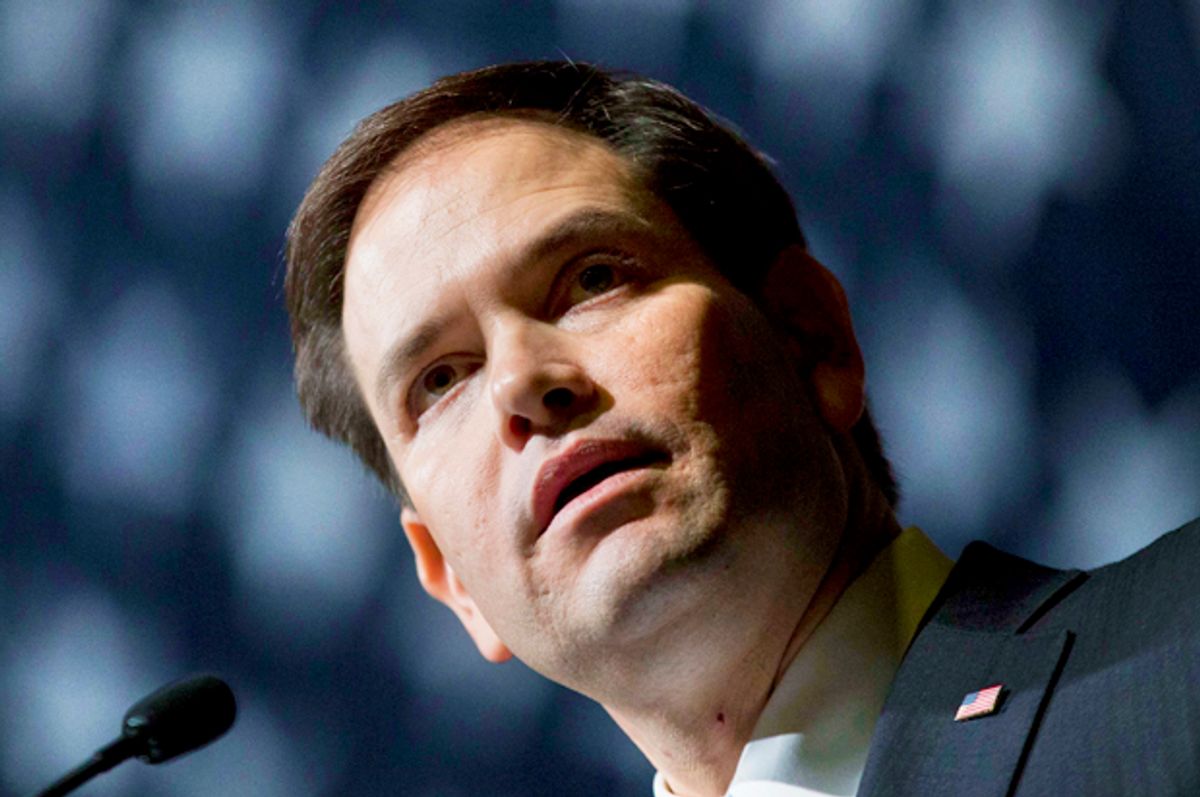In a campaign speech on Tuesday, Sen. Marco Rubio vowed to bust up the higher education “cartel.” It was an address in which the young senator was expected to detail his economic policies before tech entrepreneurs in Chicago; but Rubio left out more than a handful of details in his advocacy of for-profit colleges to challenge state schools and nonprofit private schools.
First of all, he neglected to mention the minor detail that the for-profit, corporate higher-ed market is increasingly seen as a total racket in which education corporations like Everest, Kaplan and the University of Phoenix market “low-quality” degree programs that more often than not leave buyers with incomes less than those of high school dropouts. Products called “degree programs” are sold for many thousands of dollars by companies like the massive Education Management Corporation (EDMC), which is 40 percent owned by Goldman Sachs; and if you can possibly believe it, corporations like EDMC are found to be more interested in young people’s money than their education.
Yet Rubio simply proposed “a new accreditation process that welcomes low-cost, innovative providers.” What does a “new accreditation process” mean? One can only assume that it means a loosening of regulations so that less-than-real-actual-
Rubio didn’t mention that existing education corporations, unlike virtually the entire rest of the economy, rely on government money for their massive profits, with the vast bulk of companies’ revenues coming from financial aid, federal low-interest loans and Pell grants. He failed to mention how the companies’ revenues are allowed to be composed of government money up to 90 percent, a threshold that many companies approach or exceed, and that a veterans benefits loophole to this rule lead schools to “aggressively and deceptively recruit” service members and their families into what is called by former students a “predatory lending scheme.”
Later in the speech, Rubio talked about lowering taxes, but he didn’t get to the part about how tens of billions of tax dollars are deposited into the bank accounts of education corporations only to have more than half of the students who enroll (on the taxpayers’ dime) leave “within a median of 4 months,” according to a Senate report focusing only on 2008-09 alone.
The same report found that 76 percent of the corporations on the receiving end of that unbelievable transfer of public wealth are owned either by private equity firms or publicly traded corporations “closely tracked by analysts and investors.” So it’s a money pump that sends tax dollars to Wall Street, which everyone loves.
Rubio didn’t mention how he worked behind the scenes to pull strings for Corinthian Colleges, Inc., the owner of the Everest college brand and contributor to Rubio’s PAC. Bloomberg Politics reported in April on a letter sent by Rubio to Department of Education urging that the massive corporation be allowed to continue receiving federal student loan money (Rubio's loathed tax dollars) in veritable truckloads while the company was under investigation for lying significantly to prospective students about its product, constituting a “predatory lending scheme.” The corporation closed within 12 months after years of various investigations into its shadiness, but not after receiving an unbelievable $1.2 billion in federal student loans during its final year in operation.
The attorneys general of at least 36 states are involved in investigating the for-profit higher ed sector, and as of March of this year almost 560 different education sellers have had their access to student financial aid curtailed under what the Department of Education calls “heightened cash management.”
Federal money handed out freely is chum in the water for corporations, and they’ve responded predictably. Rubio, however, presents the “cartel of existing colleges and universities” as the problem, where “market forces” do not reign. Capitalism’s market forces will clear the corruption of the cartel, Rubio promises. Yet arguably the most corruption-prone aspect of the American collegiate system, athletic departments and their football programs most pronouncedly, are the parts of campuses that operate most capitalistically, so much so that many argue that players should now be paid like employees.
Education isn’t a product to be simply bought and sold. It’s a public good. It strengthens not only the educated citizen but, in the end, her community and country. It’s not a widget. Leave the market to handle the widgets, and let the centuries-old American university system do what it’s always done perfectly well without Marco Rubio’s ideas.

Shares